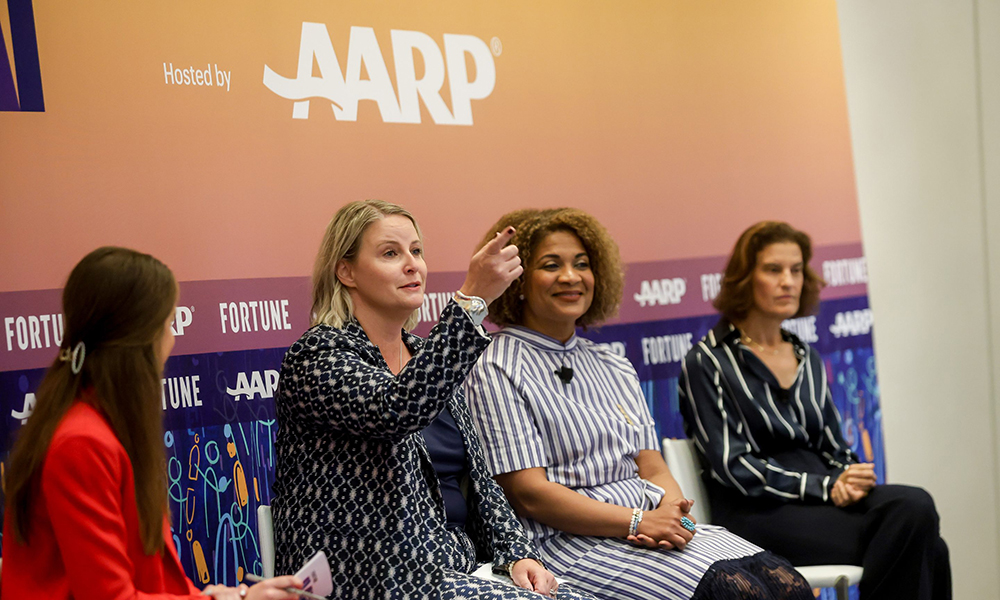
女性正重拾许多曾是禁忌的健康话题,其中有两个话题是密切相关的:衰老和更年期。随着越来越多像梅琳达·弗兰奇·盖茨(Melinda French Gates)这样的女性在谈论衰老时,将其作为一件值得庆祝的事情,人们越来越容易发现女性在衰老过程中如何通过适当的医疗保健、思维方式和支持体系实现蓬勃发展。
在周二举行的“最具影响力商界女性峰会”上,引领这些对话的女性接受了《财富》杂志采访,加深了人们对性别和年龄歧视的认识,同时使关于如何让女性的后半生尽可能健康和充实的讨论常态化。医疗保健领域行业的高管们表示,随着年龄的增长,需要注意以下几点。
1.激素替代疗法是更年期治疗的关键
更年期是女性荷尔蒙、情绪和生理发生剧烈变化的时期,通常被认为是非常严重的。更年期护理公司Midi Health的联合创始人兼首席执行官乔安娜·斯特罗布(Joanna Strober)希望女性在那些往往感到力不从心的时期里,能够感到自己掌握主动权。希望女性在很大程度上感觉不受控制的时期感到自己是掌握主动权的。
斯特罗布在“最具影响力商界女性峰会”上对《财富》杂志表示:“虽然围绝经期和更年期是不可避免的,但痛苦却不是。你不必在这段时间里遭受痛苦。对我来说,这能带来一种令人难以置信的力量。”
斯特罗布说,女性可能会出现包括脑雾、睡眠障碍、焦虑和抑郁在内的更年期症状,这些症状都与雌激素水平有关。她表示:“大约有65种症状与雌激素变化有关。”
斯特罗布说,85%的女性会出现严重的更年期症状,而对于其中90%的女性来说,激素替代疗法是解决之道。斯特罗伯说:“这意味着75%的围绝经期和绝经期女性应该接受激素替代疗法。”但她补充说,只有1.8%的女性接受了激素替代疗法。
斯特罗伯表示:“有太多的错误信息、恐惧和知识匮乏。医生也存在这方面的问题,这意味着女性没有得到正确的治疗。如果你不让她们接受最佳治疗,那么你就真正剥夺了她们实现蓬勃发展的能力。”
2.年龄歧视是真实存在的,而且对工作场所不利
美国退休人员协会(AARP)执行副总裁兼首席公共政策官黛布拉·惠特曼(Debra Whitman)在“最具影响力商界女性峰会”上表示,各个年龄段的女性都是劳动力的核心组成部分,参加工作的老年人比以往任何时候都多。惠特曼著有《后半生:关于中年及以后的7大问题解答》(The Second Fifty: Answers to the 7 Big Questions of Midlife and Beyond)一书。
然而,惠特曼说,这些女性面临着年龄歧视,这使得她们在年老时失去了工作和收入。由于性别和种族薪酬差距的存在,她们在长期内会积累的财富较少。
惠特曼对《财富》杂志表示:“许多女性不得不延长工作时间。年龄歧视是真实存在的,而且对女性的影响更大。年龄歧视叠加性别歧视等于损失。”
惠特曼发现,多世代团队能让员工蓬勃发展。惠特曼表示,年龄多样化的团队不仅工作效率更高,而且人们实际上也希望与各个年龄段的人共事。
惠特曼说:"这是我们第一次有五代人一起工作。”她鼓励领导者创造能促进多代人参与的工作场所,同时确保年长员工不会遭遇排挤。这一点对上了年纪的女性尤为重要,因为她们历来都面临着收入较低、更难找到工作的问题。
惠特曼说,年龄歧视不仅对面临年龄歧视的女性不利,对经济也不利。随着人口老龄化和出生率下降,劳动力队伍将不可避免地包括老年人,并且需要老年人。
惠特曼说:"我们将需要年长的员工。”
3.朋友是“健康福利”
孤独和孤立对老年人是有害的。全美妇女法律中心(National Women's Law Center)总裁兼首席执行官法蒂玛·戈斯·格雷夫斯(Fatima Goss Graves)说,我们应该把友谊视为一种“健康福利”。
格雷夫斯经常给她的父母寄一份研究报告,表明花时间和孙辈在一起会降低认知能力下降的风险。与此同时,惠特曼引用了哈佛大学(Harvard)规模最大的一项研究,该研究发现,健康状况、抗衰老效果最好的参与者一生中“拥有非常牢固的人际关系和友谊”。
格雷夫斯说,对于试图平衡照顾年迈的父母和孩子的三明治一代来说,支持尤其重要。
格雷夫斯告诉《财富》杂志,能够长寿的部分原因是有切实可行的想法和解决方案,让衰老变得不那么可怕,这将减轻那些随着年龄的增长而努力平衡照顾子女、父母和自己的人的压力。“这减轻了人们每天都在经历的那种未被承认、未被解决、未被讨论的深层压力。”(财富中文网)
译者:中慧言-王芳
女性正重拾许多曾是禁忌的健康话题,其中有两个话题是密切相关的:衰老和更年期。随着越来越多像梅琳达·弗兰奇·盖茨(Melinda French Gates)这样的女性在谈论衰老时,将其作为一件值得庆祝的事情,人们越来越容易发现女性在衰老过程中如何通过适当的医疗保健、思维方式和支持体系实现蓬勃发展。
在周二举行的“最具影响力商界女性峰会”上,引领这些对话的女性接受了《财富》杂志采访,加深了人们对性别和年龄歧视的认识,同时使关于如何让女性的后半生尽可能健康和充实的讨论常态化。医疗保健领域行业的高管们表示,随着年龄的增长,需要注意以下几点。
1.激素替代疗法是更年期治疗的关键
更年期是女性荷尔蒙、情绪和生理发生剧烈变化的时期,通常被认为是非常严重的。更年期护理公司Midi Health的联合创始人兼首席执行官乔安娜·斯特罗布(Joanna Strober)希望女性在那些往往感到力不从心的时期里,能够感到自己掌握主动权。希望女性在很大程度上感觉不受控制的时期感到自己是掌握主动权的。
斯特罗布在“最具影响力商界女性峰会”上对《财富》杂志表示:“虽然围绝经期和更年期是不可避免的,但痛苦却不是。你不必在这段时间里遭受痛苦。对我来说,这能带来一种令人难以置信的力量。”
斯特罗布说,女性可能会出现包括脑雾、睡眠障碍、焦虑和抑郁在内的更年期症状,这些症状都与雌激素水平有关。她表示:“大约有65种症状与雌激素变化有关。”
斯特罗布说,85%的女性会出现严重的更年期症状,而对于其中90%的女性来说,激素替代疗法是解决之道。斯特罗伯说:“这意味着75%的围绝经期和绝经期女性应该接受激素替代疗法。”但她补充说,只有1.8%的女性接受了激素替代疗法。
斯特罗伯表示:“有太多的错误信息、恐惧和知识匮乏。医生也存在这方面的问题,这意味着女性没有得到正确的治疗。如果你不让她们接受最佳治疗,那么你就真正剥夺了她们实现蓬勃发展的能力。”
2.年龄歧视是真实存在的,而且对工作场所不利
美国退休人员协会(AARP)执行副总裁兼首席公共政策官黛布拉·惠特曼(Debra Whitman)在“最具影响力商界女性峰会”上表示,各个年龄段的女性都是劳动力的核心组成部分,参加工作的老年人比以往任何时候都多。惠特曼著有《后半生:关于中年及以后的7大问题解答》(The Second Fifty: Answers to the 7 Big Questions of Midlife and Beyond)一书。
然而,惠特曼说,这些女性面临着年龄歧视,这使得她们在年老时失去了工作和收入。由于性别和种族薪酬差距的存在,她们在长期内会积累的财富较少。
惠特曼对《财富》杂志表示:“许多女性不得不延长工作时间。年龄歧视是真实存在的,而且对女性的影响更大。年龄歧视叠加性别歧视等于损失。”
惠特曼发现,多世代团队能让员工蓬勃发展。惠特曼表示,年龄多样化的团队不仅工作效率更高,而且人们实际上也希望与各个年龄段的人共事。
惠特曼说:"这是我们第一次有五代人一起工作。”她鼓励领导者创造能促进多代人参与的工作场所,同时确保年长员工不会遭遇排挤。这一点对上了年纪的女性尤为重要,因为她们历来都面临着收入较低、更难找到工作的问题。
惠特曼说,年龄歧视不仅对面临年龄歧视的女性不利,对经济也不利。随着人口老龄化和出生率下降,劳动力队伍将不可避免地包括老年人,并且需要老年人。
惠特曼说:"我们将需要年长的员工。”
3.朋友是“健康福利”
孤独和孤立对老年人是有害的。全美妇女法律中心(National Women's Law Center)总裁兼首席执行官法蒂玛·戈斯·格雷夫斯(Fatima Goss Graves)说,我们应该把友谊视为一种“健康福利”。
格雷夫斯经常给她的父母寄一份研究报告,表明花时间和孙辈在一起会降低认知能力下降的风险。与此同时,惠特曼引用了哈佛大学(Harvard)规模最大的一项研究,该研究发现,健康状况、抗衰老效果最好的参与者一生中“拥有非常牢固的人际关系和友谊”。
格雷夫斯说,对于试图平衡照顾年迈的父母和孩子的三明治一代来说,支持尤其重要。
格雷夫斯告诉《财富》杂志,能够长寿的部分原因是有切实可行的想法和解决方案,让衰老变得不那么可怕,这将减轻那些随着年龄的增长而努力平衡照顾子女、父母和自己的人的压力。“这减轻了人们每天都在经历的那种未被承认、未被解决、未被讨论的深层压力。”(财富中文网)
译者:中慧言-王芳
Women are reclaiming many once-taboo topics about their health, and two go hand-in-hand: aging and menopause. With more women like Melinda French Gates talking about aging as something to be celebrated, it’s becoming easier to see how women can thrive as they age with the right health care, mindset, and support system.
The women leading these conversations spoke to Fortune at its Most Powerful Women Summit on Tuesday, deepening awareness for sex- and age-based discrimination while normalizing discussions about making the second half of women’s lives as healthy and fulfilling as possible. Executive leaders in health care said the following are things to look out for as you age.
1.Hormone replacement therapy is key to menopause treatment
Menopause is a time of intense hormonal, emotional, and physical changes for women, often accepted to be universally terrible. Joanna Strober, cofounder and CEO of Midi Health, a menopause care company, wants women to feel in control of a time that largely feels out of their control.
“While perimenopause and menopause is inevitable, suffering is not,” Strober told Fortune at the MPW Summit. “You don’t have to suffer through this time. And for me, that is incredibly empowering.”
Women could be living with menopausal symptoms including brain fog, sleep disturbance, anxiety, and depression, Strober said, which are all related to estrogen levels. “There’s like 65 symptoms that are related to estrogen changing,” she said.
Strober said that 85% of women will have severe menopause symptoms, and for 90% of those women, hormone replacement therapy is the answer. “That means 75% of women in perimenopause and menopause should be on hormone replacement therapy,” Strober said. Yet only 1.8% of women are, she added.
“There is so much misinformation and fear and lack of knowledge. And the doctors have that too, which means that women are just not getting the right treatments,” Strober said. “If you deny them the one treatment that is best for them, then you really are denying them the ability to thrive.”
2.Age discrimination is real—and bad for the workplace
Women of all ages are a core part of the workforce, with more older people working than ever before, said Debra Whitman, executive vice president and chief public policy officer at AARP and author of The Second Fifty: Answers to the 7 Big Questions of Midlife and Beyond, at the MPW Summit.
Yet these women face ageism that pushes them out of jobs—income they need as they age due to gender and race-based pay gaps that leave them with less money in the long run, Whitman said.
“So many women have to work longer,” Whitman told Fortune. “Age discrimination is pretty real and it affects women more. Ageism times sexism equals loss.”
Whitman has found that workforces thrive with multigenerational teams. Not only are age-diverse teams more productive, according to Whitman, but people actually want to work with people of all ages.
“This is the first time that we have five generations working together,” Whitman said. She encouraged leaders to create workplaces that foster more multigenerational engagement, while ensuring that older workers are not being pushed out. This is especially important for aging women, who historically have dealt with lower incomes and more difficulty in being hired.
Age discrimination is not just bad for the women who face it, but for the economy as well, Whitman said. With an aging population and declining birth rates, it is inevitable that the workforce will include and need older adults.
“We’re going to need older workers,” Whitman said.
3.Friends are a ‘health benefit’
Loneliness and isolation can be detrimental for older adults. Fatima Goss Graves, president and CEO of the National Women’s Law Center, says we should treat friendships as a “health benefit.”
Graves frequently sends her parents a study showing how spending time with your grandchildren reduces your risk of cognitive decline. Meanwhile, Whitman cited one of the largest Harvard studies which found that participants with the best health and aging outcomes “had really strong relationships and friendships” throughout their lives.
Graves said support is especially important for the sandwich generation that tries to balance caring for aging parents and children.
Graves told Fortune that part of being able to live longer is having practical ideas and solutions that make aging less scary, which will take the pressure off of those trying to balance caregiving for children, parents, and themselves as they age too. “It’s alleviating that deep stress that people are experiencing every day that’s sort of unacknowledged, unaddressed and not discussed.”






